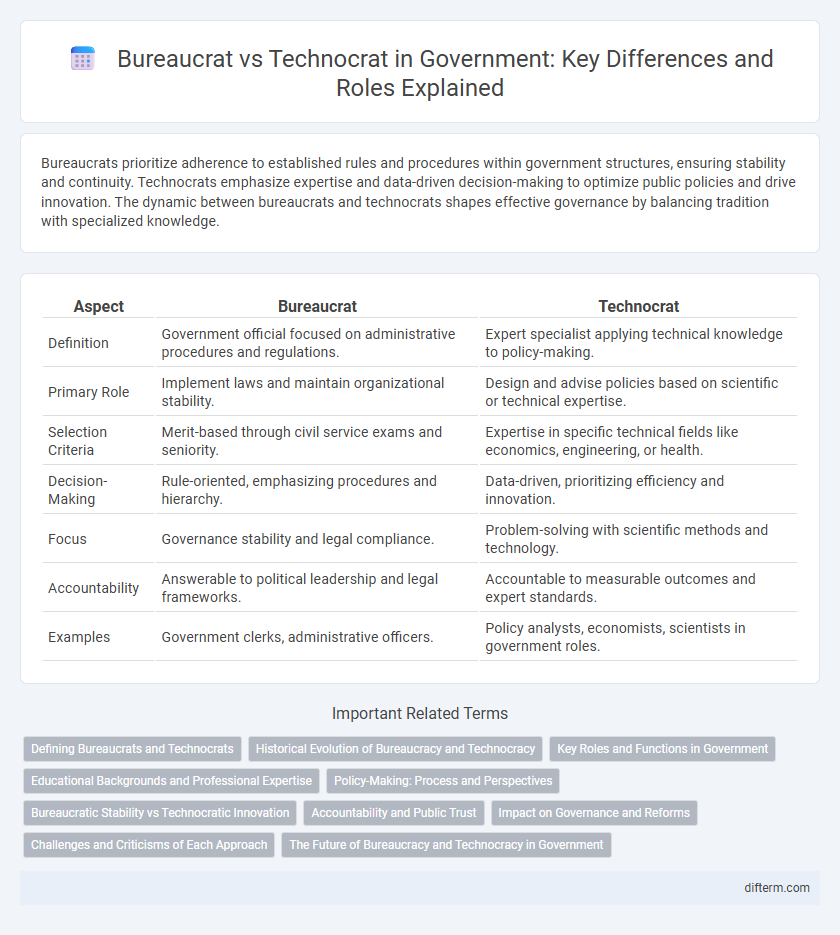Bureaucrats prioritize adherence to established rules and procedures within government structures, ensuring stability and continuity. Technocrats emphasize expertise and data-driven decision-making to optimize public policies and drive innovation. The dynamic between bureaucrats and technocrats shapes effective governance by balancing tradition with specialized knowledge.
Table of Comparison
| Aspect | Bureaucrat | Technocrat |
|---|---|---|
| Definition | Government official focused on administrative procedures and regulations. | Expert specialist applying technical knowledge to policy-making. |
| Primary Role | Implement laws and maintain organizational stability. | Design and advise policies based on scientific or technical expertise. |
| Selection Criteria | Merit-based through civil service exams and seniority. | Expertise in specific technical fields like economics, engineering, or health. |
| Decision-Making | Rule-oriented, emphasizing procedures and hierarchy. | Data-driven, prioritizing efficiency and innovation. |
| Focus | Governance stability and legal compliance. | Problem-solving with scientific methods and technology. |
| Accountability | Answerable to political leadership and legal frameworks. | Accountable to measurable outcomes and expert standards. |
| Examples | Government clerks, administrative officers. | Policy analysts, economists, scientists in government roles. |
Defining Bureaucrats and Technocrats
Bureaucrats are government officials responsible for implementing policies and maintaining administrative functions within public institutions, often characterized by hierarchical structures and adherence to established rules. Technocrats are experts with specialized knowledge or technical skills who influence policy decisions based on empirical evidence and scientific expertise, prioritizing efficiency and innovation. The distinction lies in bureaucrats managing procedural governance while technocrats contribute problem-solving capabilities through subject matter proficiency.
Historical Evolution of Bureaucracy and Technocracy
The historical evolution of bureaucracy traces back to ancient civilizations, where hierarchical administrative systems managed state functions through standardized rules and procedures. Technocracy emerged in the early 20th century as a response to industrialization, emphasizing technical expertise and scientific management in governance. The divergence highlights bureaucracy's foundation in institutional stability versus technocracy's focus on efficiency driven by specialized knowledge.
Key Roles and Functions in Government
Bureaucrats serve as career public officials responsible for implementing government policies, managing administrative tasks, and ensuring continuity within public institutions. Technocrats bring specialized technical expertise to government roles, focusing on data-driven decision-making, policy analysis, and problem-solving in complex areas such as economics, health, or engineering. Both contribute to effective governance by balancing administrative stability with informed, evidence-based policymaking.
Educational Backgrounds and Professional Expertise
Bureaucrats typically possess comprehensive education in public administration, law, or political science, paired with extensive experience in government procedures and regulatory frameworks. Technocrats are often educated in specialized technical fields such as engineering, economics, or science, leveraging their professional expertise to influence policy through data-driven and evidence-based approaches. The distinct educational backgrounds and professional skills shape their decision-making processes and effectiveness in governance roles.
Policy-Making: Process and Perspectives
Bureaucrats influence policy-making through adherence to established rules, institutional knowledge, and hierarchical procedures, ensuring continuity and stability in government operations. Technocrats contribute expertise-driven, evidence-based analysis, prioritizing technical efficiency and innovative solutions in policy formulation. The dynamic interaction between bureaucratic tradition and technocratic specialization shapes policy outcomes by balancing administrative pragmatism with expert-driven strategies.
Bureaucratic Stability vs Technocratic Innovation
Bureaucrats ensure governmental stability by maintaining established procedures and enforcing policies that uphold institutional continuity. Technocrats drive innovation through data-driven decision-making and specialized expertise, fostering adaptive solutions to complex challenges. Balancing bureaucratic stability with technocratic innovation enhances effective governance and responsive public administration.
Accountability and Public Trust
Bureaucrats are often held accountable through established legal frameworks and oversight institutions, ensuring their actions align with public policies and regulations. Technocrats, valued for specialized expertise, face accountability challenges as their decision-making may be less transparent to the general public, potentially impacting public trust. Maintaining a balance between bureaucratic accountability and technocratic efficiency is essential to uphold legitimacy and confidence in government institutions.
Impact on Governance and Reforms
Bureaucrats, deeply embedded in administrative processes, ensure continuity and stability in governance by adhering to established rules and procedures, which can sometimes slow reform implementation. Technocrats bring specialized expertise and data-driven decision-making to governance, often accelerating reforms through innovative solutions and evidence-based policies. The impact on governance lies in balancing bureaucratic experience with technocratic efficiency to achieve sustainable and effective reforms.
Challenges and Criticisms of Each Approach
Bureaucrats often face criticism for rigid adherence to rules and inefficiency, causing delays in policy implementation and limited adaptability to changing circumstances. Technocrats, while valued for expertise and data-driven decision-making, may struggle with a perceived disconnect from public needs and democratic accountability, leading to public distrust. Both approaches encounter challenges in balancing expertise with responsiveness to citizen interests and maintaining transparency in governance.
The Future of Bureaucracy and Technocracy in Government
The future of government increasingly relies on the integration of bureaucrats' institutional knowledge with technocrats' expertise in data-driven policy and innovation. As digital transformation accelerates, technocrats play a critical role in implementing AI, blockchain, and smart governance frameworks while bureaucrats ensure regulatory compliance and institutional continuity. Balancing these roles is essential for adaptive, transparent, and efficient public administration in complex global environments.
bureaucrat vs technocrat Infographic

 difterm.com
difterm.com